A Hunger for the Motor City
Hunger is everywhere in Detroit, including in the classroom. So where does food come from? How do we help?
Join our corps! Applications for 2026-2027 are now open. Apply by March 30.
Hunger is everywhere in Detroit, including in the classroom. So where does food come from? How do we help?
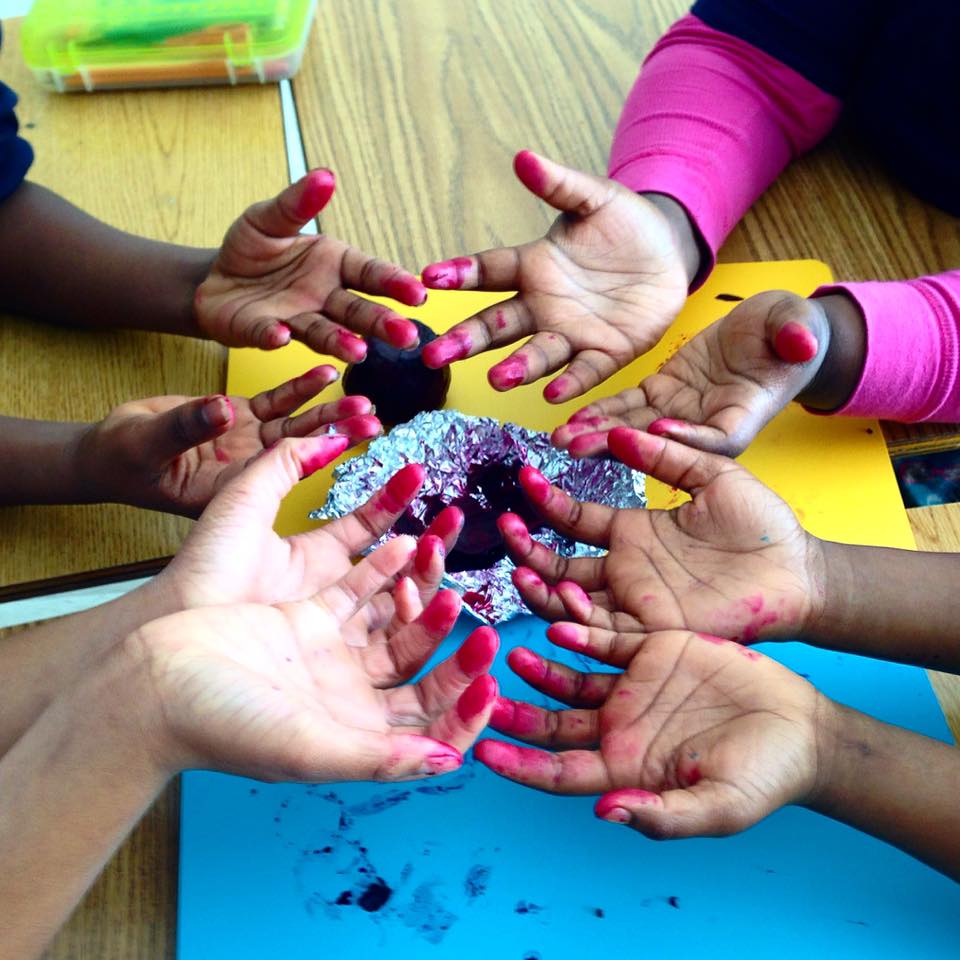
Hunger is everywhere in Detroit, whether it is visible on street corners where people hold signs asking for help, or concealed in the smiles of my students. The city faces many struggles like dilapidated buildings, bankruptcy, and crime. These downfalls are what most people see first about the city and Detroit Public Schools (DPS). That needs to change. Detroit is a vibrant city with art, urban agriculture, innovation, and strength. The focus should be on bettering the future of our community.
The hunger is often hidden in my classrooms. Students do not just tell me they did not have dinner last night. That truth is uncovered when I read between the lines.
“Where does food come from?”
I ask this question during many of my nutrition and gardening lessons, and students’ answers reveal the issue of child hunger in our community. Food comes from boxes and cans, gas stations, and fast food chains (they can name every one, but do not always recognize vegetables I bring to class). The Pre-K and 1st grade students I serve with excitedly shout out these answers, but the reality of these answers is not as exciting. Some of my students walk to gas stations with a couple of dollars to buy their dinners. These stores have processed foods high in sugar and fat, and very few fresh fruits and vegetables. Every child should have access to food that will help them grow and thrive, but that is not always feasible.
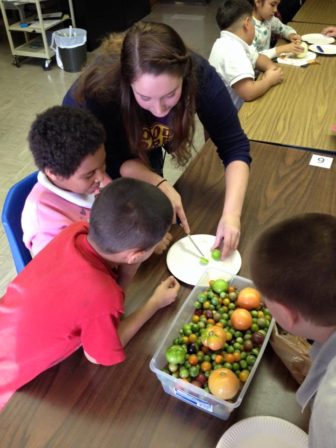 I have watched teachers give out food to families so they know they will eat that night, seen students beg for the extra fresh fruit or vegetable snack, and had one student cry because there were no seconds during a lesson. During a vegetable taste test, a sixth grader took a small bite of broccoli, turned his nose up and set it back on his paper. He turned to me and said, “Is all we get is vegetables today?” Before I could even respond, another student exclaimed, “Man, it is free food! Just eat it, you don’t turn that down.” This same young man took home many of the leftover vegetables. It took a while for me to fully process this moment. These students are eleven years old and have to consider the cost of food being a factor of how well they will eat in a day. Our students at DPS have to face many challenges beyond doing well on tests and being good students.
I have watched teachers give out food to families so they know they will eat that night, seen students beg for the extra fresh fruit or vegetable snack, and had one student cry because there were no seconds during a lesson. During a vegetable taste test, a sixth grader took a small bite of broccoli, turned his nose up and set it back on his paper. He turned to me and said, “Is all we get is vegetables today?” Before I could even respond, another student exclaimed, “Man, it is free food! Just eat it, you don’t turn that down.” This same young man took home many of the leftover vegetables. It took a while for me to fully process this moment. These students are eleven years old and have to consider the cost of food being a factor of how well they will eat in a day. Our students at DPS have to face many challenges beyond doing well on tests and being good students.
There is no doubt food access, food security, and child hunger are issues students of Detroit face. The real issue is, however: How do we help? How do we ensure children have food to eat when they walk out of school?
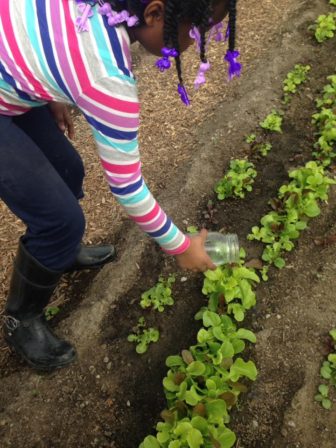 There is no one solution. Detroit is still writing its comeback story and with each struggle Detroit faces, it has the opportunity to learn and create new solutions. The DPS Office of School Nutrition, the Detroit School Garden Collaborative and FoodCorps are helping improve food access and nutrition education in DPS. The Detroit School Garden Collaborative is a school garden program that shows students food does not have to come from a box or a can, they can grow it. Students love being in the garden, and many share stories about how their family members garden too. Throughout the course of this year, I have watched many students grow and learn to appreciate the garden and the food that comes from it. The biggest success stories are when students take vegetables home and come back to tell me how they cooked and ate them with their family. Programs like the Detroit School Garden Collaborative educate and empower students and families to practice healthier habits and learn to grow their own food. That is how we work towards a solution to hunger, by putting people first.
There is no one solution. Detroit is still writing its comeback story and with each struggle Detroit faces, it has the opportunity to learn and create new solutions. The DPS Office of School Nutrition, the Detroit School Garden Collaborative and FoodCorps are helping improve food access and nutrition education in DPS. The Detroit School Garden Collaborative is a school garden program that shows students food does not have to come from a box or a can, they can grow it. Students love being in the garden, and many share stories about how their family members garden too. Throughout the course of this year, I have watched many students grow and learn to appreciate the garden and the food that comes from it. The biggest success stories are when students take vegetables home and come back to tell me how they cooked and ate them with their family. Programs like the Detroit School Garden Collaborative educate and empower students and families to practice healthier habits and learn to grow their own food. That is how we work towards a solution to hunger, by putting people first.
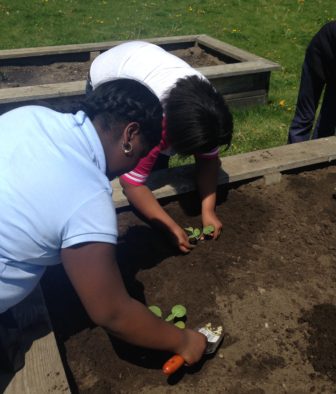 “Where does food come from?”
“Where does food come from?”
This question is not easy for everyone to answer in Detroit. When we start the conversation about child hunger, it opens the door to countless other social issues. Hunger is not the only struggle Detroit students face; many of them come from broken homes, have no permanent residences, or may not have a clean clothes to put on in the morning. That does not make the problem too big to solve, because we have to start somewhere. When I see students discover a new favorite fruit or vegetable, lick their plates clean after we cook together, and get over their fear of soil and worms in the garden, I know positive changes are happening. It is our job, as a community, to not give up on Detroit or the students of Detroit Public Schools.
The DPS Office of School Nutrition has a motto: “It takes more than books for children to learn.” Children need encouragement, opportunities, love and nourishment to grow. I am proud to be a part of this as a FoodCorps service member. My students have taught me more this year than I could have ever imagined. When I look at them, I do not see hungry, less fortunate children; I see potential. I believe in them, and their futures. They deserve the same chances as all other students in America. Together, I know we can help show these students just how valuable they are.
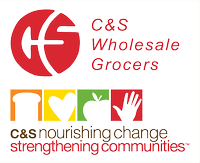 This essay was a runner up for the 2016 FoodCorps Victory Growers Award. The award, sponsored by C&S Wholesale Grocers, highlights that many children struggle with hunger and food insecurity, and that the food they receive at school is the most important meal they will get all day.
This essay was a runner up for the 2016 FoodCorps Victory Growers Award. The award, sponsored by C&S Wholesale Grocers, highlights that many children struggle with hunger and food insecurity, and that the food they receive at school is the most important meal they will get all day.
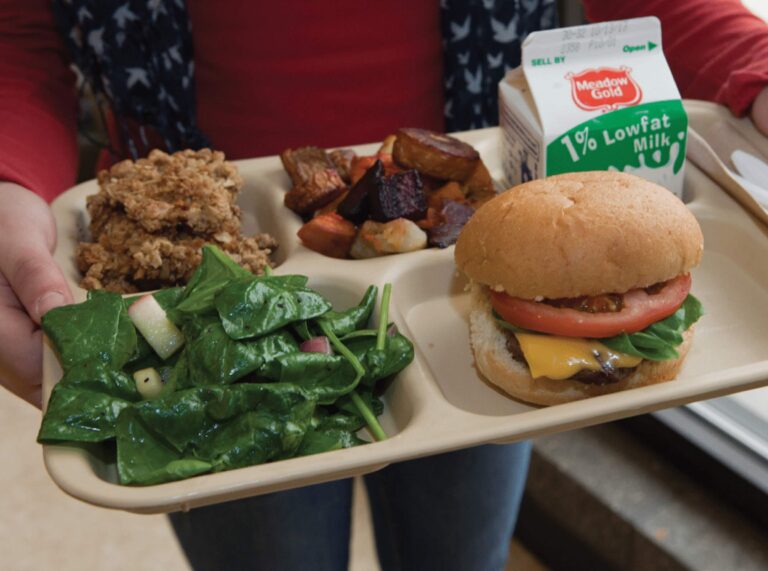
3 Reasons We Need School Meals for All
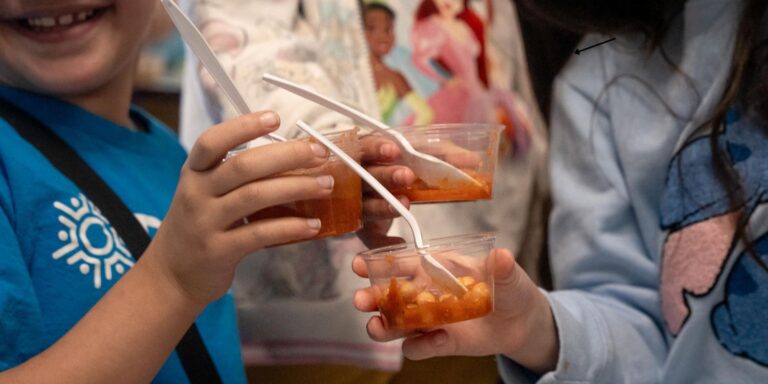
Mindful Tasting: Eating with All 5 Senses
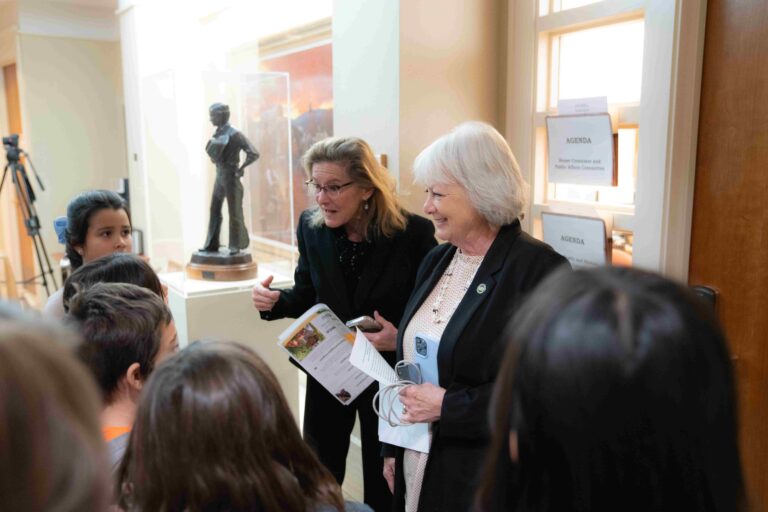
Our 2025 Child Nutrition Policy Year in Review